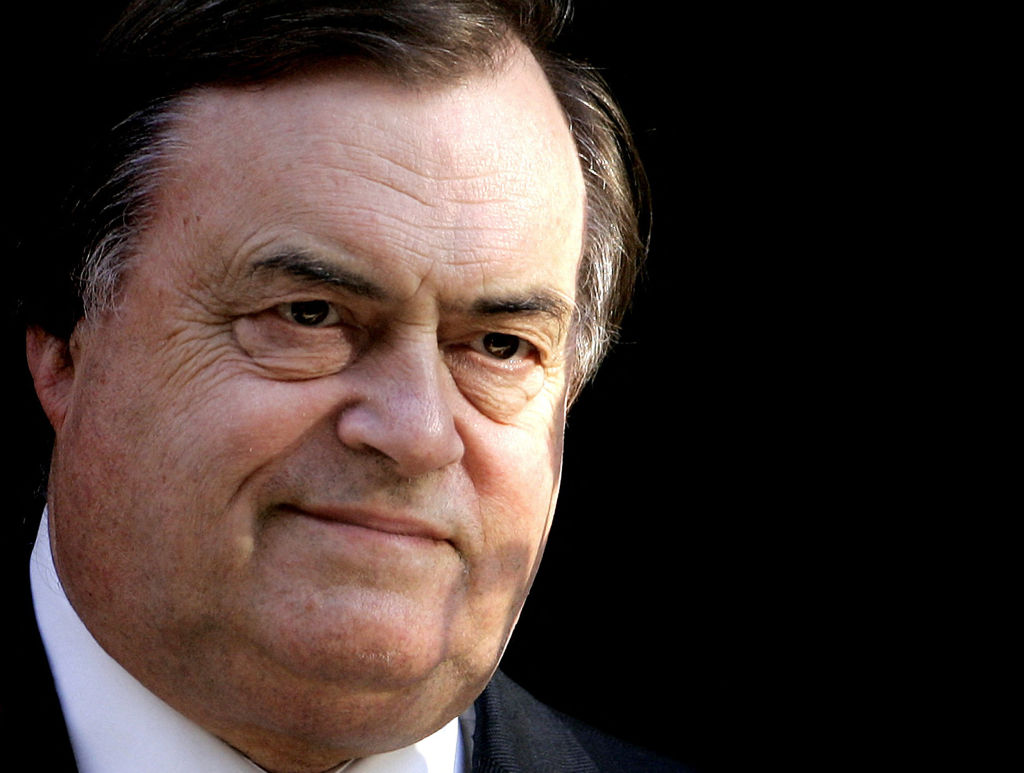John Prescott was not a great national figure; a lost prime minister or political giant denied his destiny by cruel fate. He was no Barbara Castle or Hugh Gaitskell. He was, in fact, painfully flawed, limited and out of place in the era he found himself. He leaves no great reforming legacy. His plans for English devolution failed spectacularly — ground into the dust by Dominic Cummings and the first tremors of the anti-establishment revolt to come. He was insecure and chippy. And for all these reasons I liked him and mourn his loss in British national life.
There could be an opera about Prescott in a way there simply could not be about most modern politicians: the wife, the mistress, the Jaguars, the paunch and the punch — oh, the punch! Wonderful, wonderful stuff: raw, violent emotion. Give me more. If “Prescott: The Opera” seems a little gauche, what about “Prescott: The Play” capturing all of his many human contradictions? Imagine him brooding on stage, played by Sean Bean or Gary Oldman, say, raging against grammar schools and the public school boys talking down to him while picking up the papers at Dorneywood to him portrayed as “Two Jags.” Prescott enjoying tea and croquet on the lawn. It’s all great stuff, and so very British.
There’s a joke about British politics that the Labour Party thinks Britain is really a Ken Loach film, while the Tories think it’s all a Richard Curtis romance. It’s certainly very hard to see Prescott bumbling around, dreamily, as the snow falls peacefully on some English idyll, Notting Hill style. No, he’s definitely more Kes or Cathy Come Home. But here’s the crux: he was far more real and honest than many of the current crop of Labour politicians. Many of today’s Labour MPs look like characters who would be comfortable having supper with Hugh Grant and Julia Roberts; the sort who talk with pained expression about how bad things are for ordinary folk unlucky enough not to have their life.
In fact, it is far more human, believable and even admirable to be driven by the slights of your childhood, class antagonism or even the desire for personal status than some kind of distant self-righteous pity that you don’t really believe in but think you should. Crucially, it is also more political.
I wrote yesterday about the farmers’ protest and the old Tory instincts of Jeremy Clarkson which are confounding for many political observers. This is because they are both so obviously conservative while also being, oddly, Left-wing as we have come to see it, concerned with things like biodiversity, and the limits of free-trade and globalisation. Similarly, the interesting thing about Prescott was that he also represented deep currents in English political life that feel both anachronistic and, in some senses, ahead of his time.
Prescott looked, sounded and was out of place in the technocratic cadre of administrators that dominated the Blair governments. Put simply: Prescott was not a technocrat. He tried to be, with his programme of regional assemblies, but failed. He was, ultimately, a creature of an older time before Labour had not arrived at its post-political idea of the third way.
Yet, today, the technocratic politics of the pre-crash world looks as anachronistic as Prescott once looked in his era. Politics, in the end, is the peaceful resolution of clashing interests. There are no scientific equations for managing a country which can be worked out by enlightened administrators, putting into practice some kind of universally agreed principle about equality or progress. We don’t all agree and we don’t all have the same interests. Just look at the farmers’ protest for proof. Class warfare is just another name for prioritising the financial interests of one section of society over another, which is not just perfectly reasonable but desirable. If that is not the outcome of politics then what is the point? This is also why all the condescending dismissals of the “culture wars” should be ignored. If we can argue over clashing material interests why not cultural ones?
There is plenty I did not like about Prescott and his legacy. I look at Angela Rayner today, his obvious heir, and lament the fact that she has limited herself with silly attacks on “Tory scum” and the like. I want her to aim higher because, it seems to me, she can. I have always found the caricature northerner Prescott came to embody annoying and, ultimately, constraining for other working class northerners following in his wake. Prescott was useful cement in the New Labour government, adding a bit of northern grit without ever being threatening to Blair or Brown. Those like Rayner should look to be a bit more threatening by concentrating on how to master the machinery of power, Lyndon Johnson-style. It would be wise not to be constrained by the Prescott caricature, even if that caricature is unfair.
Ultimately, this is a mild criticism. Prescott came from more humble beginnings than most in politics and achieved more: standing for Labour leader, becoming Deputy Prime Minister and, eventually a peer. But perhaps this is the best tribute one can give him: if he was a rising star today, he would seem more relevant and enlightened than he did in the Nineties. I don’t think he would become prime minister, though lesser figures have so it is not impossible. But he was, nevertheless, disparaged because of his class, just as he intuitively understood. All political careers end in failure, but his life ends with British politics needing more figures like him, not less, even if it is just for the operatic drama.











Join the discussion
Join like minded readers that support our journalism by becoming a paid subscriber
To join the discussion in the comments, become a paid subscriber.
Join like minded readers that support our journalism, read unlimited articles and enjoy other subscriber-only benefits.
Subscribe